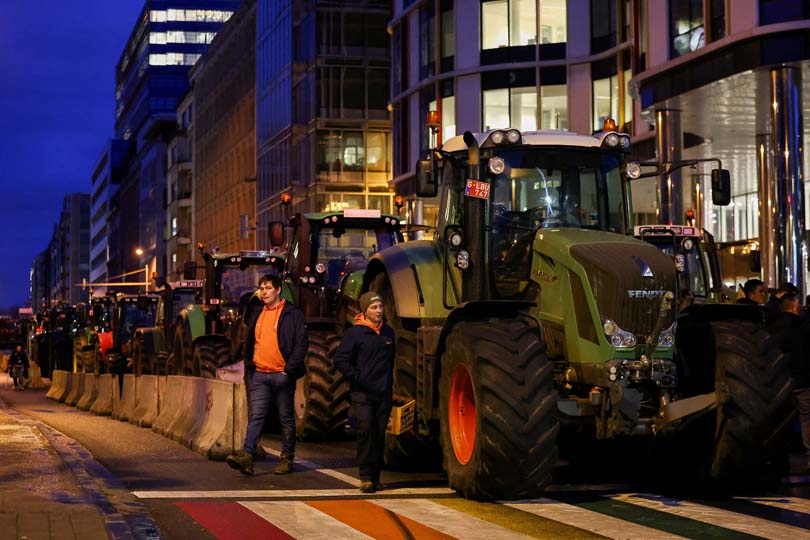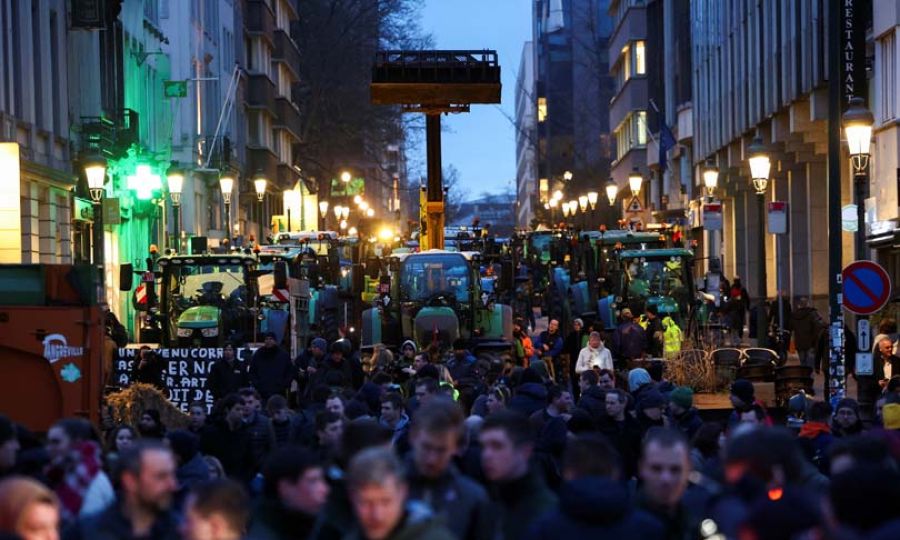

Pavlos Neophytou
The surge of farmers' fury has reverberated in a manner unprecedented for Brussels, the nerve center of European decision-making. While the European agricultural crisis received token discussion on Thursday at the periphery of the Summit of the leaders of the 27 member states, the session was underscored by significant mobilizations from numerous agricultural unions.
Notably, Italy's primary agricultural federation, Coldiretti, made its voice heard with approximately a thousand members, decrying "the folly endangering agriculture." Despite the measures announced by the European Commission on Wednesday, aimed at quelling the widespread mobilizations across many EU member states—specifically, the extension of decoupling community subsidies from fallowing and the preservation of non-productive features in arable land—protests are expected to persist, escalating as the European Parliament elections loom in June.
Meanwhile, the island's agricultural organizations are bracing for their own mobilizations, deeming the measures announced by the European Commission insufficient.

Polish farmers were among the pioneers to take to the streets and barricade border crossings as early as the spring of last year. Presently, protests have cascaded across various countries, spanning from Germany and France to Italy and Greece. Yet, what about Cyprus? To what extent does this sweeping wave of reaction impact Cypriot farmers?
Furthermore, they are gearing up for their own mobilizations in February, embarking on a march towards the House of Europe in Nicosia with tractors and agricultural vehicles, as outlined by the general secretary of the preeminent farmers' organization, "Panagrotikos," Tasos Yiapanis.
"Last year witnessed two significant tractor mobilizations. The first, held outside the House of Europe, addressed pressing environmental concerns, including environmental taxes and fallow land, as well as the EU's new regulations for member states. Concurrently, escalating production costs, driven by rising fertilizer, energy, and transportation expenses, prompted our second mobilization just before Christmas. While this effort secured aid for grain and potato producers, other sectors such as citrus, fruit trees, vineyards, open cultivation, horticulture, and greenhouses were left out," shared during the SPOR FM's broadcast "Diaspora News."
Discussing the connections between Cypriot agricultural bodies and European unions, Mr. Yiapanis highlighted, "Cyprus's agricultural movement is an integral part of COPA-COGECA, representing farmers, employers, and cooperatives across 45 countries. COPA-COGECA enjoys recognition from both the European Parliament and the European Commission, the latter engaging in active consultations. Every Cypriot agricultural organization holds membership in COPA-COGECA." He further noted Panagrotikos' affiliation with the World Farmers’ Organisation (WFO), with two representatives serving in the European Economic and Social Committee (EESC).
Reflecting on recent developments in Brussels, he acknowledged some positive steps taken by the European Commission but underscored potential insufficiencies in the measures proposed, suggesting the need for sustained farmer protests.
"As we approach February, plans for additional mobilizations are underway. Symbolically, we intend to march with tractors and agricultural vehicles to the House of Europe to voice our concerns. While Cyprus's population of one million may appear modest, our voice, whether big or small, deserves to be heard," emphasized Mr. Yiapanis.

Furthermore, during Agriculture, Rural Development, and Environment Minister Maria Panayiotou's visit to the Avgorou community, where she inspected damages to potato crops and provided directives for immediate compensation, Panikos Hambas, EKA's general secretary, remarked, "As farmers' tractors encircle the European Union's institutions across Paris, Germany, Greece, and Spain, Cyprus's agricultural community has and will continue to mobilize. It is crucial for the entire Cypriot population to recognize that agriculture and its people are the cornerstone of our food security. Hence, every existing issue demands resolution."
As per European unions, farmers find themselves ensnared in debt, squeezed by formidable middlemen to slash prices, grappling with the onslaught of agrochemical corporations, and bearing the brunt of severe weather phenomena. Meanwhile, their produce is depreciated owing to the influx of low-cost foreign imports.
This confluence of challenges persists amidst a backdrop where farmers have long depended on subsidy schemes that tilt the scales in favor of industry giants. The conflict in Ukraine has only exacerbated the predicament. While the surge in prices for staples like wheat has proven ephemeral, a surplus in supply looms large.
[This article was translated from its Greek original]































